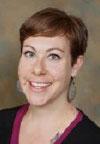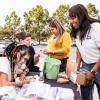
Shobe Lectures Show the Value of Bioethics
The following story is a composite of several patients and families and does not represent one individual or one family.
Twenty years ago, within hours of his birth, Jordan was rushed to the neonatal intensive care unit. Before he was a day old, his mother learned that Jordan was born with a hypoplastic left heart – a congenital heart disease that is fatal unless palliative surgery occurs quickly.
Over the next weeks – and then years – Jordan underwent surgery after surgery, while his mother sat vigil by his bed. She feared for his life – and worried that the constant surgeries were torture for her son. But Jordan survived and, indeed, thrived, growing into a funny, sarcastic, cerebral and philosophical boy.
In the ensuing years, life pushed forward. Jordan’s parents had two more sons – the boys fought and played together as brothers do – and his mother’s fears about Jordan subsided until he entered high school.
At that point, he became progressively fatigued and out of breath. His heart had begun to fail, and it became clear he needed a transplant. After one year of waiting, he received a new heart. But he remained incredibly ill, and his mother resumed her vigils. She took meticulous notes, kept a record of when Jordan took his medications and of the blood levels of his immunosuppressive drugs, and spoke with the transplant team regularly.
Then Jordan’s mother became ill herself. She endured surgery after surgery, leaving her debilitated and in chronic pain. The transplant team treating Jordan began to suspect his mother was becoming dependent on opioids. They did not know how this was affecting Jordan, but they knew he’d stopped showing up for his appointments. He seemed to have stopped caring for himself and for his heart and eventually presented to the local emergency room in acute decompensated heart failure. It was evident that he needed a second transplant to save his life.
The problem was that the transplant team was no longer sure that Jordan was a good candidate for such a precious resource. They told Jordan and his mother that he would not be listed for a transplant, offering a plethora of medical reasons: His kidneys were compromised, he was overly immunosuppressed, and he was markedly malnourished. These were all true.
But it was also true that the transplant team hesitated to list Jordan for a heart transplant because of psychosocial concerns. They worried that if Jordan received a second heart transplant, he would not take care of it, as he had not taken proper care of his first. The transplant team also discussed these concerns at length with Jordan and his mother.
What the transplant team did not discuss with the family were their concerns about the mother’s health, her suspected opioid addiction and her husband’s reported quick temper. Yet behind closed doors, they discussed these concerns among themselves, even as they watched Jordan’s condition deteriorate.
Then Jordan decompensated further. Hastily, frenetically, the transplant team put their concerns aside and placed him on extracorporeal life support, converted this into a mechanical assist device and listed him for a heart. He received it within days.
Jordan lives with this new heart today, but his health is tenuous, and the transplant team is haunted by concerns that they did not do right by this family. They worry that had they been more direct about their concerns, less intimidated by confrontation, less hampered by implicit biases, Jordan might have been spared the months of worsening heart function, of deterioration and of potential compromise to his recovery. And even as they hope for Jordan’s success with this new heart, they worry that the decision to transplant his heart was not made calmly. They worry that the decision to list him occurred amid panic. These disjointed emotions – the disquiet that the transplant team feels – haunt them, distract them, cause them shame.
Questioning Ourselves
These are not unusual feelings for those of us who care for critically ill children and their families. Inevitably, we at times question ourselves and question if we – as individuals, as institutions, as a society – are doing right by our patients and their families. As medical discovery has progressed exponentially, these questions have only become more common. We can resuscitate children who have diseases they would have died from in previous eras. We can place dying children onto extracorporeal life support; we can take over the work of their heart. We can save lives again and again. But ignoring that health care providers experience distress, unrest and even trauma – often because of these interventions – can make it difficult for us to act with integrity and to care for our patients fully. It can make it impossible to do this work.
Bioethics is a discipline that can serve as a framework to guide us through these trials via its basic tenets of beneficence, nonmaleficence, autonomy and justice. When we face impasses and distress in the care that we provide, these tenets remind us to consider the best interests of the patient and strive to do no harm. They remind us that patients are sovereign beings, with their own sets of values and beliefs. And they remind us that, though we try to respect autonomy, each of us is part of a community and a society in which we impact one another. None of these tenets of bioethics outweighs another, but at times, they conflict. Thus, we may further struggle. And then bioethics reminds us to focus on “the importance of compassion, sensitivity, commitment, and high moral standards in the delivery of health care.”[1]
UCSF’s Endowed Lectureships in Ethics and Spirituality
These are the principles that drove Thelma Shobe Cook, an alumna of UCSF School of Nursing and a public health nurse, throughout her career. To uphold these high standards, she created an endowed chair and lectureship in ethics and spirituality at the School. Her mission was to ensure that as science advances, we do not ignore the ethical and spiritual challenges that arise.
In 2016, two highly esteemed ethicists, John Lantos, MD, and Cynda Rushton, PhD, delivered the Thelma Shobe Endowed Lectureships in Ethics and Spirituality, which provided extraordinary guidance on the topic of moral distress.
Lantos is a pediatrician and the director of the Children’s Mercy Center for Bioethics in Kansas City, Mo. In his lecture, he spoke about “building an ethical climate in a pluralist children’s hospital.” How do we care for a child best when the desires of the family clash with the beliefs of the nurses, and perhaps those of the nurses differ from those of the doctors? When we are all distressed, when we all have different ideas of what is best for the child, how do we make sense of this conflict and make the right choice? Lantos suggested a framework for building an ethical climate that helps clinicians wrestle with these questions.
Then Rushton offered ideas for how to endure in such a climate. The Anne and George L. Bunting Professor of Clinical Ethics at the Berman Institute of Bioethics and the School of Nursing at Johns Hopkins University, Rushton presented the notion of moral residue – a burden we carry with us as a result of the moral distress we sustain. She focused on moral resilience, teaching us to uphold our ethical embodiment and maintain our integrity in the face of impossible clinical dilemmas. Through this resilience, we can unburden ourselves from the residue of our distress, and may thus continue to care for our patients with compassion, sensitivity and commitment, upholding our high moral standards.
These are essential concepts for those of us working with critically ill children, and they deserve more attention in training and throughout our careers. As with the case of Jordan, medical progress can, at times, push against the limits of what we feel is morally and ethically right. We are left with moral distress, with moral residue. The Shobe lectureships this year offer a framework for confronting our moral distress without fear or shame. We are reminded that only by acknowledging the unease that we face and addressing the ethical dilemmas that cause friction in our institution and within ourselves, will we maintain our humanity and the humanity of our patients.
 Efrat Lelkes Efrat Lelkes is a UCSF pediatric intensivist who is currently a palliative care and hospice fellow at the University of Washington and Seattle Children’s Hospital. Following a pediatrics residency at the University of Chicago Medicine Comer Children’s Hospital, she came to UCSF Benioff Children’s Hospital San Francisco in 2009 to complete a pediatric critical care fellowship. After a stint at the bench studying immunology, she completed a certificate in pediatric bioethics through Children’s Mercy Hospital in Kansas City, Mo. She focuses on narrative writing and the ethics of palliative and end-of-life care within critical care medicine.
Efrat Lelkes Efrat Lelkes is a UCSF pediatric intensivist who is currently a palliative care and hospice fellow at the University of Washington and Seattle Children’s Hospital. Following a pediatrics residency at the University of Chicago Medicine Comer Children’s Hospital, she came to UCSF Benioff Children’s Hospital San Francisco in 2009 to complete a pediatric critical care fellowship. After a stint at the bench studying immunology, she completed a certificate in pediatric bioethics through Children’s Mercy Hospital in Kansas City, Mo. She focuses on narrative writing and the ethics of palliative and end-of-life care within critical care medicine.
Reference
1. Bioethics. American Academy of Pediatrics website. http://www2.aap.org/Sections/bioethics/default.cfm. Accessed November 16, 2016.



